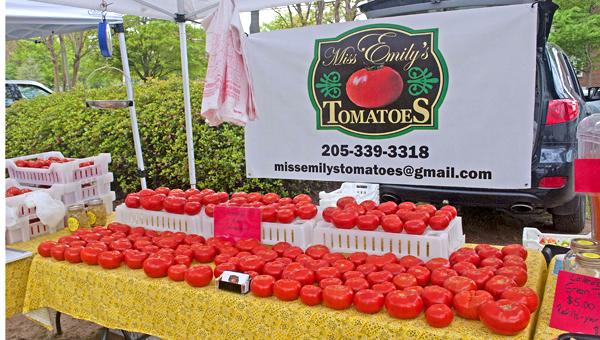The Homegrown Alabama Farmers Market caters to students and locals alike by providing fresh, healthy ?produce and convenient payment options.
The market provides a wide variety of locally grown produce, meat and dairy products. The market runs every Thursday from 3 to 6 p.m. at Canterbury Episcopal Church.
The market’s co-manager, Dabney Powell, a senior majoring in nutrition, said the organization was started by students in 2005 and has grown from once a semester to every week.
“It’s a whole different side to the Tuscaloosa ?community,” Powell said. “There’s a lot of students that come to the market because that’s obviously who it’s marketed to, but there’s also a lot of professors that come and people from the community. There’s always a lot of little kids and dogs.”
At peak season, the market has about 16 vendors, all from the state of Alabama. The market requires that all food sold must have been grown within the state and ?periodically does farm visits to monitor farming practices.
Vendors sell everything from organic produce to grass-fed beef, pork and chicken, as well as ice cream, baked goods, tea and soap. Powell said the popular produce for the late summer season includes tomatoes, peaches, okra, squash, corn, apples, pears, figs, eggplant and berries.
Co-manager Calee Camp, a senior majoring in nursing, said one of the most popular offerings is the local honey, which helps prevent allergies.
Andrew Kesterson of Belle Meadow Farm has worked with Homegrown Alabama for a year. He grows organic produce on 13 acres outside of Tuscaloosa.
Kesterson, a 2011 graduate of the University, said ?seasons determine what he grows, but he tries to produce a wide variety of vegetables. Currently, he is selling cherry tomatoes, okra, squash and eggplant, but for the fall he will have sweet potatoes, kale, collards, Brussels sprouts and broccoli.
“We do pretty much everything kind of year by year,” he said. “We’ll vary the kind of stuff that we do but we have kind of a base that we work with and we branch out from there and include different types of stuff.”
Both Powell and Camp agreed that farmers markets are important because they support the local economy and have less impact on the environment.
“I’m from a small town, and I like to support the local farmers,” Camp said. “We don’t go to the grocery store for food. So it’s something that I was involved with in my own hometown before I moved here and I was super happy that it was offered here.”
Powell also spoke about the health benefits of locally grown food.
“When you go and shop at Publix for your groceries, it’s traveled from another state or even another country,” she said. “The minute you pick something off of the vine or out of the ground, it immediately starts to spoil, so if it’s going to travel across the country they’re going to have to treat it with chemicals so it stays preserved. It’s not as fresh. When the food is put through that kind of strain, a lot of the nutrition quality diminishes.”
Farmers markets have a reputation for being expensive, but Powell said their farmers make an effort to keep things affordable for students. The market is distinct in that it accepts Bama Cash in addition to cash, credit and debit cards and EBT food stamps.
“People complain a lot about ‘I don’t want to shop at a farmer’s market, it’s so expensive,’” Powell said. “It’s not really. Our farmers set their prices to match grocery stores. You can get a great deal.”
Once a month, Homegrown has a market event to focus on whatever is in season, the most recent being “Melon Madness.” On event days, there are food demos, live music, games and contests. This month’s “Back To School Barbecue” will be Aug. 28 and will spotlight ?protein vendors.









